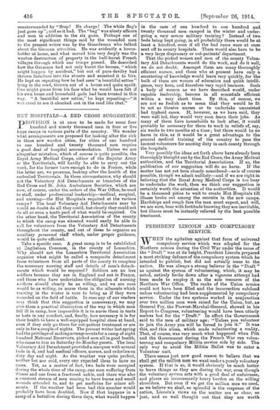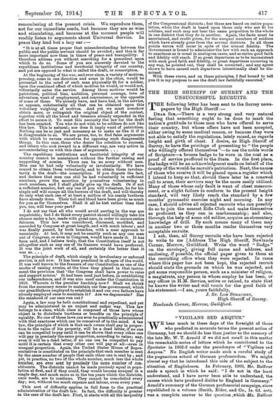PRESIDENT LINCOLN AND COMPULSORY SERVICE.
WHEN the agitation against that form of universal compulsory service which was adopted for the Northern armies during the Civil War under the name of the " Draft " was at its height, President Lincoln prepared a most striking defence of the compulsory system which he intended to publish, but did not actually issue to the nation. He was always a strong believer in the "Draft " as against the system of volunteering, which, it may be noted, entirely broke down after a vigorous attempt had been made to employ it as the sole resource of the Northern War Office. The ranks of the Union armies could not have been filled and the insurrection subdued unless volunteering had been supplemented by compulsory service. Under the two systems worked in conjunction over two million men were raised for the Union, but, as General Fry, the Provost-Marshal-General, showed in his Report to Congress, volunteering would have been utterly useless but for the " Draft." In effect the Government said to the men of military age : "'Unless you volunteer to join the Army you will be forced to join it," It was this, and this alone, which made volunteering a reality. That, of course, was very much what happened when Pitt and the Government during the French War ran volun- teenng and compulsory Militia service side by side. The only way to avoid the Militia Ballot was to enter a Volunteer unit.
There seems just now good reason to believe that we shall get the million men we want under a purely voluntary system. If that is so, it would obviously be much better to leave things as they are during the war, even though the voluntary system acts with a good deal of unfairness, and places an unnecessarily heavy burden on the willing shoulders. But even if we get the million men we need, as we believe we shall, so splendid is the response of the nation, Lincoln's views on the matter are so clear, so just, and so well thought out that they are worth
remembering at the present crisis. We reproduce them, not for our immediate needs, but because they are so wise and stimulating, and because at the moment people will readily listen to arguments about Universal Service. In peace they lend but a lazy ear :—
" It is at all times proper that misunderstanding between the public and the public servant should be avoided ; and this is far more important now than in times of peace and tranquillity. I therefore address you without searching for a precedent upon which to do so. Some of you are sincerely devoted to the republican institutions and territorial integrity of our country, and yet are opposed to what is called the draft, or conscription.
At the beginning of the war, and ever since, a variety of motives, pressing, some in one direction and some in the other, would be presented to the mind of each man physically fit for a soldier, upon the combined effect of which motives he would, or would not, voluntarily enter the service. Among these motives would be patriotism, political bias, ambition, personal courage, love of adventure, want of employment, and convenience, or the opposite of some of these. We already have, and have had, in the service, as appears, substantially all that can be obtained upon this voluntary weighing of motives. And yet we must somehow obtain more, or relinquish the original object of the contest, together with all the blood and treasure already expended in the effort to secure it. To meet this necessity the law for the draft has been enacted. You who do not wish to be soldiers do not like this law. This is natural; nor does it imply want of patriotism. Nothing can be so just and necessary as to make us like it if it is disagreeable to us. We are prone, too, to find false arguments with which to excuse ourselves for opposing such disagreeable things. In this case, those who desire the rebellion to succeed, and others who seek reward in a different way, are very active in accommodating us with this class of arguments.. • .
The republican institutions and territorial integrity of our country cannot be maintained without the further raising and supporting of armies. There can be no army without men. Men can be had only voluntarily or involuntarily. We have ceased to obtain them voluntarily, and to obtain them involun- tarily is the draft—the conscription. If you dispute the fact, and declare that men can still be had voluntarily in sufficient numbers, prove the assertion by yourselves volunteering in such numbers, and I shall gladly give up the draft. Or if not a sufficient number, but any one of you will volunteer, he for his single self will escape all the horrors of the draft, and will thereby do only what each one of at least a million of his manly brethren have already done. Their toil and blood have been given as much for you as for themselves. Shall it all be lost rather than that you, too, will bear your part?
I do not say that all who would avoid serving in the war are unpatriotic; but I do think every patriot should willingly take his chance under a law, made with great care, in order to secure entire fairness. This law was considered, discussed, modified, and amended by Congress at great length, and with much labour ; and was finally passed, by both branches, with a near approach to unanimity. At last, it may not be exactly such as any one man out of Congress, or even in Congress, would have made it. It has been said, and I believe truly, that the Constitution itself is not altogether such as any one of its framers would have preferred. It was the joint work of all, and certainly the better that it was so. . . .
The principle of draft, which simply is involuntary or enforced service, is not now. It has been practised in all ages of the world. It was well known to the framers of our Constitution as one of the modes of raising armies, at the time they placed in that instru- ment the provision that the Congress shall have power to raise and support armies.' It had been used just before, in establishing our independence, and it was also used under the Constitution in 1812. Wherein is the peculiar hardship now ? Shall we shrink from the necessary means to maintain our free government, which our grandfathers employed to establish it and our own fathers have already employed once to maintain it ? Are we degenerate ? Has the manhood of our race run out ?
Again, a law may be both constitutional and expedient, and yet may be administered in an unjust and unfair way. This law belongs to a class, which class is composed of those laws whose object is to distribute burthens or benefits on the principle of equality. No one of these laws can ever be practically administered with that exactness which can be conceived of in the mind. A tax law, the principle of which is that each owner shall pay in propor- tion to the value of his property, will be a dead letter, if no one can be compelled to pay until it can be shown that every other one will pay in precisely the same proportion, according to value; nay, even it will be a dead letter, if no one can be compelled to pay until it is certain that every other one will pay at all—even in unequal proportion. Again, the United States House of Repre-
sentatives is constituted on the principle that each member is sent
by the same number of people that each other one is sent by ; and yet, in practice, no two of the whole number, much less the whole
number, are ever sent by precisely the same number of con-
stituents. The districts cannot be made precisely equal in popu- lation at first, and if they could, they would become unequal in a single day, and much more so in the ten years which the districts, once made, are to continue. They cannot be remodelled every day; nor, without too much expense and labour, even every year.
This sort of difficulty applies in full force to the practical administration of the draft law. In fact, the difficulty is greater in the case of the draft law. First, it starts with all the inequality of the Congressional districts ; but these are based on entire popu- lation, while the draft is based upon those only who are fit for soldiers, and such may not bear the same proportion to the whole in one district that they do in another. Again, the facts must be ascertained, and credit given, for the unequal numbers of soldiers which have already gone from the several districts. In all these points errors will occur in spite of the utmost fidelity. The Government is bound to administer the law with such an approach to exactness as is usual in analogous cases, and as entire good faith and fidelity will reach. If so great departures as to be inconsistent with such good faith and fidelity, or great departures occurring in any way, be pointed out, they shall be corrected ; and any agent shown to have caused such departures intentionally shall be dis- missed.
With these views, and on these principles, I feel bound to tell you it is my purpose to see the draft law faithfully executed."



































 Previous page
Previous page